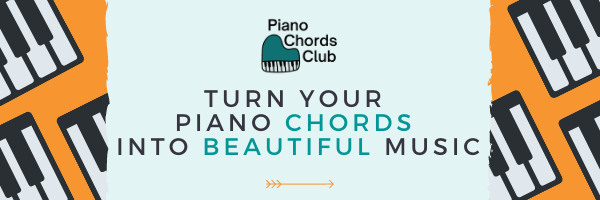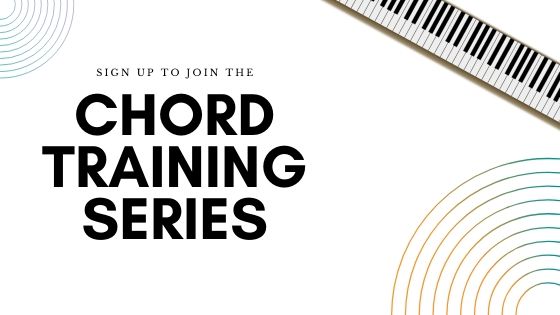How To Play Gm Piano Chord (G Minor Chord)
Gm piano chord is pretty common and a great one to know - especially if you like playing in flats! It is a minor chord and has the notes: G Bb D.
You'll find lots on the G minor piano chord here including:
- Gm piano chord notes
- Gm piano chord chart
- how to play the chord (video)
- which fingers to use for Gm
- Gm/Bb chord
- Gm/D chord
- G minor chord progressions
- chord inversions for Gm
- and some chord theory
Gm Piano Chord Notes
The Gm piano chord notes are G Bb D.
While you can play this chord in either the left hand or the right hand, keep G as the lowest note overall.
If you are learning Gm and only playing chords in your left hand, this is a good time to start expanding into playing chords in the right hand as you've likely got a bit of a foundation now.
Gm Piano Chord Chart
Gm chord notes on the treble clef and on the piano keys:
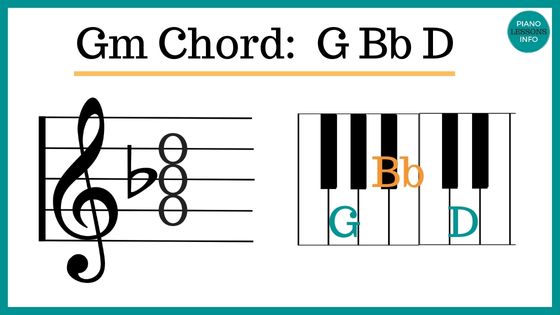
How to Play Gm Chord on Piano
This short video will show you how to play the Gm chord on the piano:
Gm Piano Chord Finger Positions
When you play the G minor chord, you can use the standard fingering for major and minor chords.
Use fingers 1, 3 and 5, or thumb, middle finger and pinkie, for the G minor chord.
This is a good standard way to play this chord however, you don't always have to play it this way. These finger positions are a great foundation.
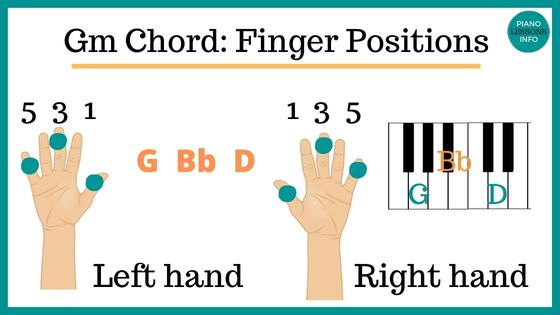
Gm/Bb Piano Chord
If you see Gm/Bb, play Bb as your lowest note in the left hand. Bb is your bass note.
The rest of the notes of the chord will come above that in any order.
If you are playing the Gm chord in left hand only, you'll need to play it as an inversion (see below) in order for Bb to be at the bottom.
Gm/D Piano Chord
If you see Gm/D, it means that D needs to be the bass note - the lowest note your left hand plays.
The rest of the notes of the Gm chord will come above that.
G Minor Piano Chord Progressions
Here are some good, basic chord progressions to practice the Gm chord with:
Gm Chord Progression 1:
Gm Cm Bb D
Gm Chord Progression 2:
Gm Bb F Dm
Gm Chord Progression 3:
Bb Eb Gm F
G Minor Piano Chord Inversions
Chord inversions are standard ways to play and practice the different positions you can play a chord in.
You can play the notes of the Gm chord anywhere, but learning inversions is a great way to get the muscle memory needed to change from chord to chord quickly.
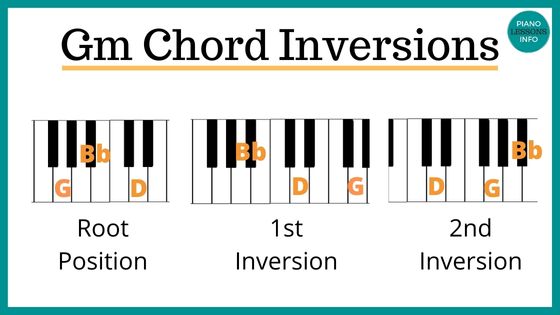
The Gm piano chord inversions are:
Root: G Bb D
1st Inversion: Bb D G
2nd Inversion: D G Bb
Chord Theory for G Minor Chord
G minor and Bb major share a key signature - 2 flats, Bb and Eb.
To play in the key of G minor means you play both of those flats.
You can easily find a minor chord from a major chord and this is easy to do with Gm since the G chord is so common.
The G chord, a major chord, is G B D. You can turn this into a minor chord by "lowering the 3rd". This is referring to the 3rd note of the G major scale - B. Lowering B by one semi-tome means that B becomes Bb. And that's how we get G Bb and D. The G minor chord.
If you need more help understanding key signatures, visit the key signatures page.
If you need to look up more chords, visit the Piano Chord Charts page or download your own copy below.
Free Download:
Ultimate Chord Cheat Sheet
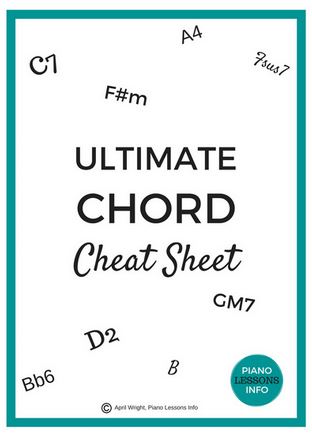
Subscribe below and get free access to the (printable) Ultimate Chord Cheat Sheet.
Recent Articles
-
Piano Notes Chart
Nov 20, 23 10:21 PM
Find a piano notes chart for treble clef and bass clef notes as well as the different types of notes. -
D Chord on Piano + Diagram, How To & Theory
Oct 24, 23 12:20 AM
Learn how to play the D chord on piano with diagram, fingering, D/A, D/F# and a theory explainer. -
Diminished Piano Chords: Chart & How to Make Them
Oct 09, 23 09:23 PM
Learn the different diminished piano chords and how to make them. Here you'll find both a diminished chord chart and an explanation.
- Home
- 14 Day Chord Challenge
- Gm Piano Chord
Free Download:
Ultimate Chord Cheat Sheet

Subscribe below and get free access to the (printable) Ultimate Chord Cheat Sheet.



